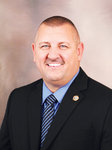

Chatham County Sheriff Mike Roberson has lived in Chatham County his entire life, meeting his wife Annette when he was in the first grade. “I love our home and believe we live in the best place in the world,” he says. Roberson was elected sheriff in 2018 after having been appointed to the position in 2016. He previously served as a firefighter and paramedic, juvenile officer, jail administrator and chief deputy. He and Annette have two children. In this week’s ch@t feature, Roberson discusses the work of his department, the challenges of crime prevention in Chatham County, and the programs his department uses to build community relationships — plus, how he reacted when a local student saw him at school and said, “Don’t shoot!”
Let’s start with the office and duties of the sheriff… It’s the only constitutionally-mandated position in each county in North Carolina. What kinds of work falls within your office’s responsibility other than “traditional” law enforcement work, and how do you balance that work with the office’s other responsibilities?
The Sheriff’s Office is responsible for four primary duties: operation of the jail, opening and closing court, civil process, and keeping the peace. As you mention, traditional law enforcement is only a small piece of what we do as an agency. We do a lot of problem solving and our ultimate goal is crime prevention — because any response is already too late.
“Keeping the Peace” includes crime prevention, like the work we do on patrol, in the schools, investigations, and drug-related enforcement. We answer 911 hang-up calls, perform house and business checks, and spend as much time as possible engaging with the community to deter crime and build positive relationships.
We balance the workload and expectations by prioritizing and planning as much as we can. When responding to calls, crimes in progress (or active emergencies) are considered top priority. Crimes against people, especially violent crime, are assigned greater priority than property crimes, and so on. We also manage the timely service of civil papers and mental health transports, maintain safe and secure conditions for inmates while providing for their physical and mental health needs, and so much more. I’m extremely proud of my staff for the work they do!
When it comes to law enforcement, crime prevention and helping to prosecute crimes, what kinds of unique challenges does Chatham County — with its large geographic area and small municipalities — present to you and your office?
Because Chatham County covers such a large area, there can be wide distances between calls. It takes roughly an hour and fifteen minutes to drive from corner to corner, so we’ve broken the county into individual coverage zones. Each patrol deputy is responsible for covering an average of 140 square miles within a zone. We also assist other agencies who may be operating within those zones, such as city police, State Parks, State Highway Patrol and N.C. Wildlife personnel.
Some parts of the county are extremely rural while others are very urban and highly populated. The diversity of Chatham County also brings diverse expectations and understandings of what a Sheriff’s Office does or should do. Towns may have additional resources that unincorporated areas do not, so it takes a lot of teamwork and collaboration to offer the best emergency response to those who need it regardless of where they are located. My staff does a great job as evidenced by our low crime rate. We are currently the 15th safest county in the state!
There’s been a lot of discussion about the opioid crisis. Can you talk about opioids and illicit drugs in general, and about what your deputies are seeing and working against in Chatham County?
In Chatham County, we began feeling the true impact of the national opioid epidemic only recently. Drug activity has been on the rise in recent months and we are actively working to combat those issues. The epidemic began with prescription pills and is now transitioning to hard drugs, like heroin, as pills become harder to obtain.
We teamed up with the Chatham County Health Department in 2016 to create the Sheriff’s Prevention Partnership on Controlled Substances, which has allowed us to join forces with other first responders, healthcare providers, schools, medical practitioners, non-profits, pharmacies, and other community partners to share resources and shape response to the crisis. We have taken a holistic approach surrounding drug addiction, involving mitigation, education, enforcement and treatment. Thanks to this partnership, all patrol deputies carry the opioid reversal drug Narcan in their vehicles.
Right now, Chatham County is seeing an increase in cocaine laced with fentanyl, which can be highly addictive and even lethal. We are also seeing methamphetamine usage in some areas, and needle use brings the collateral threat of gepatitis and HIV. We are actively partnering with federal and surrounding agencies to share information and resources in order to effectively combat these issues.
Your office is heavily engaged in a wide variety of programs in Chatham County and you’re all visible in the county, engaging with the citizenry. Why is this important?
To prevent crime and build positive relationships. Relationships allow for free information exchange, but only if residents feel comfortable approaching deputies. These relationships are not built overnight and cannot be built in a crisis. It’s vital that the public sees deputies as humans who are fallible, passionate, empathetic and professional.
It is also beneficial for our staff to see community members as more than a call for assistance. It’s an opportunity to engage with residents when they are not in an emergency situation, which creates a completely different dynamic.
I was reminded of the importance of community engagement while visiting a middle school. I was high-fiving students when a young male saw me and threw his hands against the wall yelling, “Don’t shoot!” I thought he was joking until I saw the fear in his eyes. Fear of law enforcement was his reality, but that isn’t his fault — it’s our fault for not sharing the whole story about who we are and what we stand for. If all that gets publicized or talked about is negativity, violence and disparity, that’s how the public will think we operate. It’s our responsibility to share the positive work we do in the community.
Chatham is an extraordinarily diverse county, particularly when you consider the rural nature of the western side and the growth and expansion of the eastern side. Is your office having to make changes or adaptations, or do you anticipate making any, as this growth occurs, and the diversity continues to be so prevalent?
We need more patrol deputies! However, because the crime rate in Chatham County remains low, it is difficult to justify the need for more manpower and obtain necessary funding. I believe the growing population should be considered, especially if we want to keep our low crime rate. It takes a minimum of two deputies per 1,000 people to maintain the current level of services, and more than that to provide for the growing expectations of the public.
All areas of our office will need to grow as the overall population increases. Last year, we answered more than 27,000 calls for service. We averaged one call every 19 minutes, 24/7!
We are currently bringing residents together and creating meaningful dialogue through the S.T.A.R. (Sheriff’s Training Academy for Residents) Program and Community Appreciation Night, but we also anticipate changes in public expectation of how we communicate and share information as we progress.